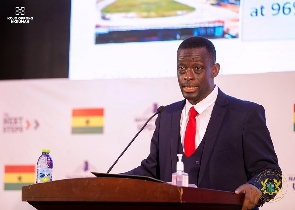 Western Regional Minister, Kwabena Okyere Darko-Mensah
Western Regional Minister, Kwabena Okyere Darko-Mensah
The Western Regional Minister, Mr Kwabena Okyere Darko-Mensah, has called on farmers and the youth to pursue Agriculture as a business enterprise.
He said agriculture and its related business should be seen as a major avenue for sustainable employment and income.
Mr Darko-Mensah said the various pro-agriculture initiative such as the Planting for Food and Jobs (PJF), Planting for Export and Rural Development (PERD), Rearing for Food and Jobs (RFJ) and Aquaculture for Food and Jobs(AFJ) should be taken seriously and patronized by all.
Mr Darko- Mensah said this when he took his turn at the 'Western Region Day" at the ongoing 36th Farmers day celebration at Techiman in the Bono-East Region.
This year's farmer day is being celebrated on the theme: "Ensuring Agriculture development under COVID-19 Opportunities and Challenges.”
Mr Darko-Mensah pointed out that the chosen theme for the celebration reflected the important role of the Agriculture sector in the economic development of the country.
He said it also reemphasized agriculture's contributions to all the other sector of the economy.
The Regional Minister indicated that Agriculture played a critical role in economic growth, food security, poverty reduction and rural development through industrialization.
" It is the main source of income for around 2.5 billion people in the developing world," he said.
Touching on the Western Region, Mr Darko-Mensah said food processing alone employed Gari markers, bakers, palm oil and kernel processors, among others.
The Minister said lessons of COVID-19 had created a new sense of awareness about ensuring food security at home rather than dependence on food imports.
"The panic that accompanied the pandemic at its onset was a great test for the resilience of Ghana Agriculture sector in terms of food availability, but thankfully we were apt in response to the virus due to the Agriculture interventions put in place by the government."
Mr Darko-Mensah said the pandemic did not adversely affect food production and supply in the Western Region, adding that "there is evidence that local staples are rich in nutrients which support the development of the immune system."
He said the Western Region had a conducive environment for farming, making it the leading producer of rubber, cocoa, coconut and second in oil palm production in the country.
Mr Darko-Mensah said Agriculture undoubtedly was a way of life for people of the Western Region even with the discovery of oil and gas in commercial quantities, agriculture still employed the majority of the population.
He commended the government for boosting agriculture production and productivity through the introduction of pro-agriculture initiatives.
In 2020, 413,754 seedlings of coconut, oil palm and cocoa were distributed to 1,905 females and 816 male farmers under the Planting for Export and Rural Development (PERD).
A total of 16141 farmers made-up of 11,495 males and 4,646 females also benefited from subsidized fertilizer and improved seeds under the Planting for Food and Jobs initiative.
He said under the Rearing for Food and Jobs initiative, the Region was currently brooding five thousand cockerel chicks to be supplied to 500 beneficiary farmers in ten MMDAs.
Also, 1000 pigs are expected to be distributed to 200 farmers in MMDAs in the region, he said, adding that the programme was stalled by an outbreak of swine fever disease in the Sekondi-Takoradi Metropolis.
He said as of the end of 2019, a total of 22,696 farmers had benefited from special rice project and were able to produce 51,509.70 metric tonnes of rice, making the region self-sufficient in rice production.
He said under the Aquaculture for Food and Jobs, the Region benefitted from 20 community fish ponds in the Wassa East District.
The Regional Minister said the region saw a 248 per cent increase in Technology Adoption as a result of enhanced extension services delivery and that 174 motor bikes were distributed to Extension Officers which enabled them to effectively reach a total of 23,348 farmers this year.
He announced that the Western Regional Coordinating Council (WRCC) initiated a five million coconut project in which five million coconut seedlings were being distributed to coconut farmers in the Region.
Mr Darko-Mensah commended the government, Ministry of Agriculture, Fisheries and Aquaculture Development, the awardees and stakeholders for the hard work, which has helped to sustain the nation's economy over the years.